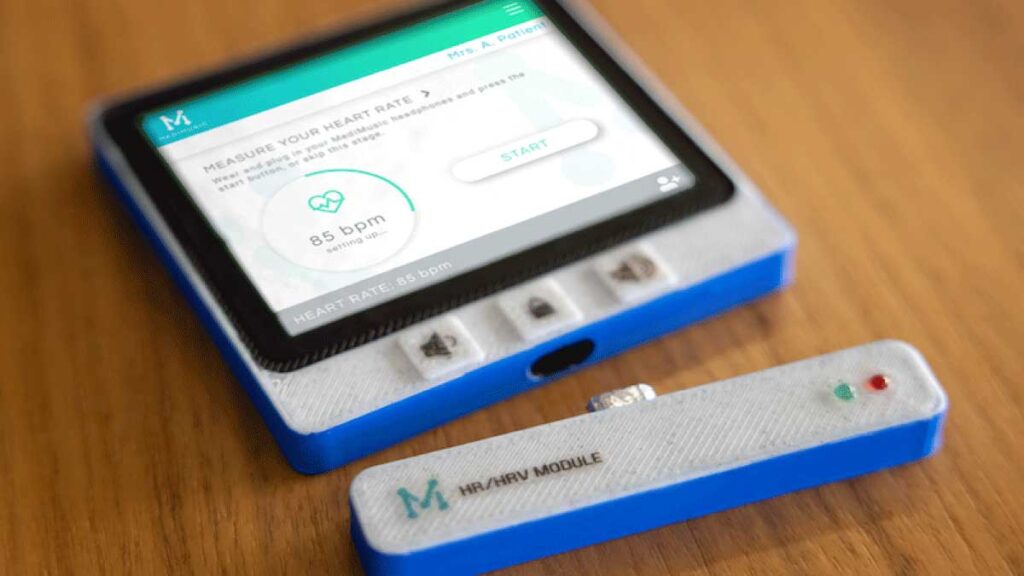AI-powered tech offers music for anxiety and pain

British health tech start-up MediMusic has created an app and a streaming device called the MediBeat that dispenses personalized playlists to reduce anxiety and pain in patients using a ‘digital drip’ to administer the most calming music.
As such, patients could soon be prescribed soothing music selected by artificial intelligence (AI) to ease anxiety and pain, after an encouraging trial of a Hull health tech start-up’s new app.
The AI-powered tech could be used in treatment of dementia, pre/post operation, chronic pain, dentistry, and Alzheimer’s Disease through to improving motor response as part of a physical rehabilitation program.
Initial clinical NHS trials at Lancashire Teaching Hospitals NHS Foundation Trust, found the use of MediMusic saw an up to 22 percent reduction in heart rate in patients with dementia during the COVID-19 pandemic. It can also be used in hospitals, care homes and dentist surgeries.
So how does the app work?
According to a nationwide NHS Staff Survey with nearly 600,000 responses, almost half of NHS staff in England (44 percent) have reported feeling unwell from work related stress during 2020, the highest rate recorded in the past five years.
The MediMusic app works with the patient’s age, gender, nationality, and ethnicity and based on sociological and psychological science, it then compiles in seconds the 20-minute playlist of soothing music to calm them.
Playlist running order is designed to reduce heart rate and stress hormones like cortisol and promotes relaxation through hormones like dopamine and oxytocin. The music is played through earphones and the MediBeat streaming device and a heart rate monitor worn on the wrist.
Dr Jacqueline Twamley, academic research and innovation manager at the Centre for Health Research & Innovation at Lancashire Teaching Hospitals NHS Foundation Trust said: “The results have been very impressive. We used MediMusic on 25 patients suffering from dementia during the COVID-19 pandemic. One 75-year-old patient had vascular dementia and was known to have sundowning behaviour, which presents as agitation.”
“The initial findings are so positive that we’re now looking at how it can help ease anxiety and stress in doctors and nurses working in critical care on the frontline of caring for COVID patients,” he added.
Music therapy has already been proven in several previous studies to reduce anxiety by 44 percent and pain by 28 percent. This has resulted in a reduction in the need for relevant medication by 24 percent.
The brain responds to music more than any other stimulus. MediMusic’s algorithms extract the relevant features from the digital DNA of a piece of music, resulting in a fingerprint for healthcare use.
Using AI, machine learning (ML) and the data about the patient, the AI-powered tech then automatically creates playlists from music streaming services within a couple of clicks and plays the music through a streaming device called the MediBeat and a pair of headphones.
Gary Jones, CEO and co-founder of MediMusic said: “We’ve always felt the music can soothe our soul but now we have compelling evidence that it can help our mind and body too. With MediMusic, we’ve managed to digitally fingerprint the DNA of music so we can prescribe the right type of music as medicine.”
